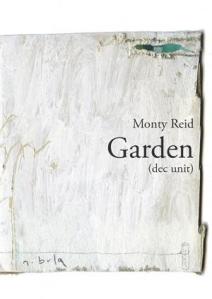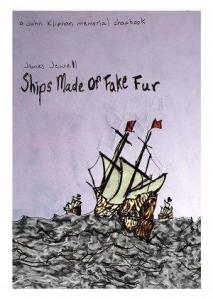‘Garden (dec unit)’ by Monty Reid and ‘Ships Made of Fake Fur’ by James Jewell
-Reviewed by Seán Hewitt–
In Monty Reid’s Garden (dec unit) and James Jewell’s Ships Made of Fake Fur, Corrupt Press offer us new musings on sparseness. The pamphlets themselves are simple, paper booklets, uninspiringly yet neatly designed. But it’s what’s on the inside that counts…
Monty Reid, Garden (dec unit) (Corrupt Press, 2012)
Canadian poet Monty Reid’s Garden (dec unit) sequence is more of a ‘collection’ than Jewell’s Ships Made of Fake Fur (see below), in that it follows the months of the year and the place of the gardener (and the garden) as the seasons work themselves over the land. One might call it a modern-day attempt at the Shepheardes Calendar. Reid begins with a moonlit December scene and continues through to the following November, offering minimalistic, uncluttered observations and thoughts inspired by the garden.
When Monty Reid looks at plants, gardens, nature, he plunges straight into a world of abstracts and ungraspables. ‘It is unobservable’, and he likes it that way. This poet has settled himself nicely into the ecopoetics currently being spearheaded by writers like Alice Oswald, also a gardener. Unfortunately, Reid does not fare well from the comparison. As in the work of Oswald, nature is indifferent to the poet’s gaze, refusing to be colonised. It is alive and autonomous, and Reid grapples with this idea in the Garden sequence, trying not to impose himself on the landscape. The best example of this is, perhaps, in the seventh poem, ‘June’:
If our apprehension of the world cannot be contained
by thinking – at least not by thinking as philosophy has traditionally
conceived it – then the last thing we should do
is to try to think it again.
It’s not my garden.
I just work there.
However, it seems here, and throughout this pamphlet, that instead of applying any new philosophy to his own work, and exploring it there, Reid seems to be working out a new philosophy via poetry, which can sometimes lead to confusion or abstraction. Where Oswald might dismantle the tradition of English Romanticism in her wonderful ‘Another Westminster Bridge’, instructing Londoners to ‘go and glimpse the lovely inattentive water / discarding the glance of many a bored streetwalker’, Reid instead chooses to explicitly work with philosophies:
It is not art, but everything
splits the real world into a real world and an imaginary world.
There is little pleasure to be gleaned from a philosophy whose bones are so unceremoniously exposed. There are moments of clarity in this pamphlet, and Reid has a great sense for an ending, with lots of these poems having a great sting in the tail. However, Reid’s Garden (dec unit) often strikes as a series of jottings, of thoughts waiting to be turned into poems, somehow incomplete in their minimalism. Maybe that’s where the reader comes in.
James Jewell, Ships Made of Fake Fur (Corrupt Press, 2012)
James Jewell’s Ships Made of Fur, at a first glance, seems to take the opposite approach to Reid’s Garden (dec unit). A singer-songwriter, originally from Pennsylvania, Jewell’s poetry seems more openly conversational, comic and, in parts, verbose. The chapbook consists of prose poems, odes, observational sketches and short lyrics, and in this it is more obviously eclectic than Reid’s.
It is anchored in modern life (the ‘ships’ of the title are, in fact, people roaming a cityscape: ‘The floundering ships / made of fake fur are floating / through the coffee shops, / restaurants and cinemas of Amsterdam’), and Jewell is clearly most comfortable in the realm of the colloquial and the comic. He has the comedian’s ability to draw acute examples from the everyday, bringing out the oddities of chance encounters, making them both poignant and light-hearted by turns. The best of these little sketches is ‘Three Beards’:
Homesick,
standing in a semi circle.
Three beards of different lengths
and one without a beard,
looking at each other,
fondly,
curiously.
“My boyfriend had a beard as long as yours.”
She shows us pictures.
In these few lines, Jewell manages to pack a mass of suggestion and curiosity with an unassuming ease. There is the sense of competition between the men, brought out by the way the girl trumps the other three with her boyfriend’s superior facial hair, there is the sense of separation (the girl from her boyfriend, who is featured in the past tense; the three men from home etc.), and the small hints of friendship and kinship between the ‘three beards’. The final image of the photographs confirms this collective yearning for an elsewhere. Jewell finds the casual, everyday emotion in such encounters, skilfully working it into his verse in a way that is both unobtrusive and effective.
He spins thought-provoking tales, featuring characters as diverse as Bob Marley, Napoleon and the Cookie Monster, but always keeps the emotional core of the poem visible beneath these comic layers. Jewell’s poetry avoids abstraction by cutting close to the issue at hand without revealing it explicitly, and this is where his talent lies. He has the ability to situate his reader, he talks to them not from the poet’s ‘imagined height’ but eye-to-eye, and it is on this common ground that we are able to relate to him, and feel the humorous sentiment of his sketches.



